Delaying harvest for naturally drying maize grain increases the risk of kernel rot and fumonisin contamination.
Delaying harvest for naturally drying maize grain increases the risk of kernel rot and fumonisin contamination.
Author(s): COSTA, R. V. da; QUEIROZ, V. A. V.; COTA, L. V.; SILVA, D. D. da; LANZA, F. E.; ALMEIDA, R. E. M. de; PEREIRA, A. A.; ALVES, R. R.; CAMPOS, L. J. M.
Summary: Artificial drying, although costly, ensures a safe storage and preserves post-harvest grain quality. Alternatively, a more costeffective measure is to delay harvest to promote natural drying, but this management may increase the risk of mycotoxigenic ear rot fungi contamination. The objective was to evaluate the effect of increasing maize harvest delay on fungal disease and fumonisin levels. Three maize hybrids (BRS1035, Attack and DKB390 YG) were sown in the field to study the effect of five harvest delays (15, 30, 45, 60 and 75 days) after the optimum date (18% grain moisture). There was a significant trend of increasing the incidence of kernel rot and total fumonisins in the grains when delaying harvest, but fungal incidence and mycotoxin contamination varied with the hybrid. The main fungi detected in the grain samples were Fusarium verticillioides and Stenocarpella maydis. The hybrid DKB390 YG showed significantly lower incidence of F. verticillioides contamination and lower fumonisin accumulation in the grains than the other hybrids. The hybrid Attack was the least susceptible to kernel rot incidence. Our data shows that delaying harvest for minimizing drying costs may increase the risk of mycotoxin contamination in maize in the tropics of Brazil.
Publication year: 2018
Types of publication: Journal article
Unit: Embrapa Maize & Sorghum
Observation
Some of Embrapa's publications are published as ePub files. To read them, use or download one of the following free software options to your computer or mobile device. Android: Google Play Books; IOS: iBooks; Windows and Linux: Calibre.
Access other publications
Access the Agricultural Research Database (BDPA) to consult Embrapa's full library collection and records.
Visit Embrapa Bookstore to purchase books and other publications sold by Embrapa.

